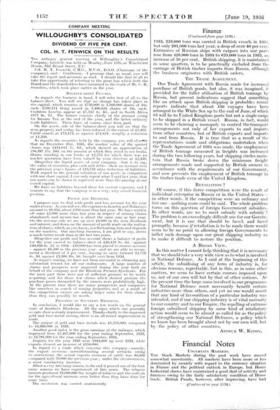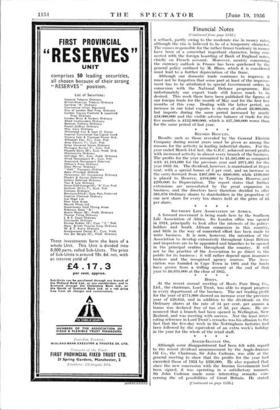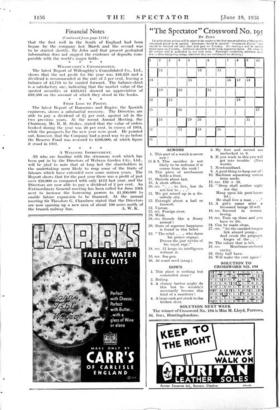Financial Notes
UNCERTAIN MARKETS.
THE Stock Markets during the past week have moved somewhat uncertainly. All markets have bCen more or less dominated by anxiety with regard to the currency situation in France and the political outlook in Europe, but Home Industrial shares have maintained a good deal of activity and firmness owing to the fairly satisfactory condition of Home trade. British Funds, however, after improving, have had (Continued oti'pagi 1154.) — Financial Notes . (Continued from page 1152.)
a setback, partly owing to the moderate rise in money rates, although the rise is believed to be of a temporary character. The causes responsible for the rather firmer tendency in money have been of a somewhat important character, being con- nected with the foreign hoarding of Bank of England notes, chiefly on French account. Moreover, anxiety concerning the currency outlook in France has been quickened by the general policy outlined by M. Blum, which it is considered must lead to a further depreciation of the franc.
Although our domestic trade continues to improve, it must not be forgotten that some part at least of the improve- ment has to be attributed to special Government orders in connexion with the National Defence programme. But unfortunately our export trade still leaves much to be desired. This week there have been published the figures of our foreign trade for the month of May and for the first five months of this year. Dealing with the latter period, an increase in our total exports is shown of about £6,000,000, but imports during the same period increased by nearly £34,000,000 and the visible adverse balance of trade for the five months is £132,000,000, which is £27,500,000 worse than for the same period of last year.
*
RECORD RESULTS.
Results such as those revealed by the General Electric Company during recent years must be given as among the reasons for the activity in leading industrial shares. For the year ended March 31st last, the G.E.C. achieved record profits with increased activity in almost every branch of the business. The profits for the year amounted to £1,485,000 as compared with £1,184,000 for the previous year and £971,481 for the year 1933-34. The dividend, however, is maintained at 10 per cent. with a special bonus of 5 per cent, and an increase in the carry-forward from £487,000 to £680,000, while £100,0(H) is placed to Reserve, £194,000 to Taxation Reserve, and £299,000 to Depreciation. The report states that further extensions are necessitated by the great expansion in business, and the directors have therefore decided to offer 381,670 Ordinary shares to shareholders in the proportion of one new share for every ten shares held at the price of £3 per share.
* * * *
SOUTHERN LIFE ASSOCIATION OF AFRICA.
A forward movement is being made here by the Southern Life Association of Africa. Its London office was opened in 1924, principally to look after the interests of its policy- holders and South African connexion in this country, and little in the way of concerted effort has been made to write business. It is now, however, the intention of the Association to develop extensively throughout Great Britain and inspectors are to be appointed and branches to be opened in the principal centres throughout the country. It will not be the practice of the Association to go direct to the public for its business : it will rather depend upon insurance brokers and the recognised agency sources. The Asso- ciation was founded in Cape Town in 1891 and the funds have grown from a trifling amount at the end of that year to £6,834,000 at the close of 1935. * * BOOTS.
At the recent annual meeting of Boots Pure Drug Co., Ltd., the chairman, Lord Trent, was able to report progress in every department of the business. The net trading profit for the year of £771,000 showed an increase over the previous year of £20,853, and in addition to the dividends on the Ordinary shares at the rate of 24 per cent. per annum a bonus was declared free of tax of 3d. per share. He an- nounced that a branch had been opened in Wellington, New Zealand, and was meeting with success. Not the least inter- esting reference in Lord Trent's remarks was his allusion to the fact that the five-day week in the Nottingham factories had been followed by the equivalent of an extra week's holiday in the year for the whole of the retail staff.
ANGLO-IRAN IAN OIL.
Although some disappointment had been felt with regard to the recent dividend announcement by the Anglo-Iranian Oil Co., the Chairman, Sir John Cadman, was able at the general meeting to show that the profits for the year had exceeded those of 1934 by 1336,000. He also reported that since the new concession with the Iranian Government had been signed, it was operating in a satisfactory manner. Sir John Cadman made some interesting remarks con- cerning the oil possibilities of Great Britain. He stated
(Continued on page 1156.)
Financial Notes
(Continued from page 1154.) that the first well in the South of England had been begun by the company last March and the second was to be started shortly. Sir John said that present geological information does not suggest the existence of deposits com- parable with the world's major fields.'
WILLOUGHBY'S CONSOLIDATED.
The latest Report of Willoughby's Consolidated Co., Ltd., shows that the net profit for the year was £46,428 and a dividend is recommended at the rate of 5 per cent. leaving a balance of 24,719 to be carried forward. The balance-sheet is a satisfactory one, indicating that the market value of the quoted securities at £424,011 showed an appreciation of £88,388 on the amount at which they stood in the books.
FROM Loss TO PROFIT.
The latest Report of Ransomes and Rapier, the Ipswich engineers, shows a substantial recovery. The Directors are able to pay a dividend of 2k per cent. against nil in the two previous years. At the recent Annual Meeting, the Chairman, Mr. R. R. Stokes, stated that the value of orders booked during the year was 20 per cent. in excess of 1934, while the prospects for the new year were good. He pointed out, however, that the Company had a good way to go before the Reserve Fund was restored to £106,000, at which figure it stood in 1931.
* * *
A WELCOME IMPROVEMENT.
All who are familiar with the strenuous work which has been put in by the Directors of Welwyn Garden City, Ltd., will be glad to note that at long last the shareholders in the undertaking seem likely to reap some of the fruits of labours which have extended over some sixteen years. The Report shows that for the past year there was a profit of just over £16,000 as compared with only £112 last year, and the Directors are now able to pay a dividend of 2 per cent. An Extraordinary General meeting has been called for June 24th next to increase the borrowing powers to £1,200,000 to enable future expansion to be financed.. At the annual meeting Sir Theodore G. Chambers stated that the Directors are now opening up a new area of about 100 acres north of












































 Previous page
Previous page